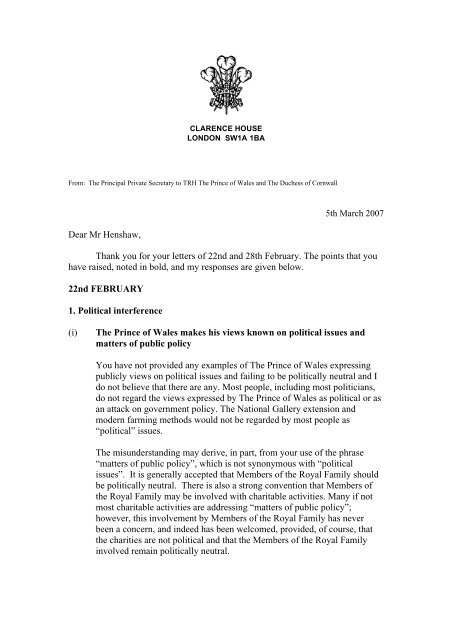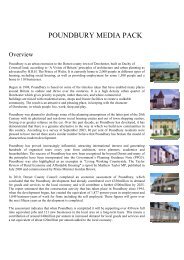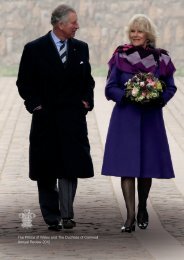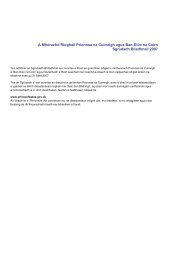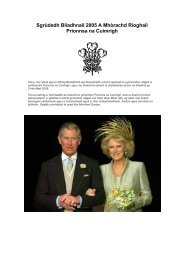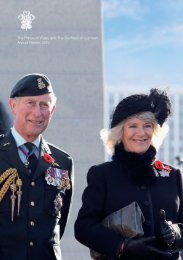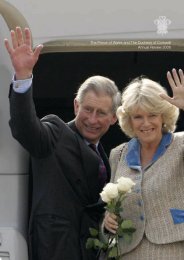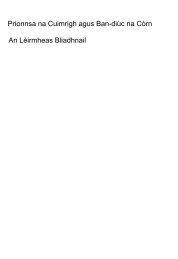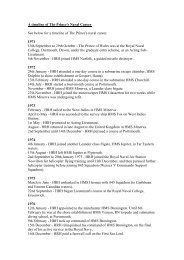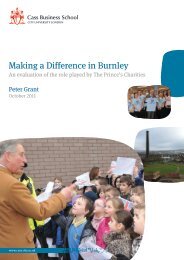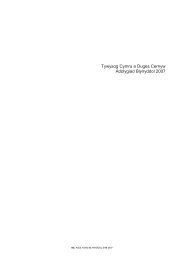5th March 2007 Dear Mr Henshaw, Thank you for your letters of ...
5th March 2007 Dear Mr Henshaw, Thank you for your letters of ...
5th March 2007 Dear Mr Henshaw, Thank you for your letters of ...
You also want an ePaper? Increase the reach of your titles
YUMPU automatically turns print PDFs into web optimized ePapers that Google loves.
CLARENCE HOUSELONDON SW1A 1BAFrom: The Principal Private Secretary to TRH The Prince <strong>of</strong> Wales and The Duchess <strong>of</strong> Cornwall<strong>Dear</strong> <strong>Mr</strong> <strong>Henshaw</strong>,<strong>5th</strong> <strong>March</strong> <strong>2007</strong><strong>Thank</strong> <strong>you</strong> <strong>for</strong> <strong>you</strong>r <strong>letters</strong> <strong>of</strong> 22nd and 28th February. The points that <strong>you</strong>have raised, noted in bold, and my responses are given below.22nd FEBRUARY1. Political interference(i)The Prince <strong>of</strong> Wales makes his views known on political issues andmatters <strong>of</strong> public policyYou have not provided any examples <strong>of</strong> The Prince <strong>of</strong> Wales expressingpublicly views on political issues and failing to be politically neutral and Ido not believe that there are any. Most people, including most politicians,do not regard the views expressed by The Prince <strong>of</strong> Wales as political or asan attack on government policy. The National Gallery extension andmodern farming methods would not be regarded by most people as“political” issues.The misunderstanding may derive, in part, from <strong>you</strong>r use <strong>of</strong> the phrase“matters <strong>of</strong> public policy”, which is not synonymous with “politicalissues”. It is generally accepted that Members <strong>of</strong> the Royal Family shouldbe politically neutral. There is also a strong convention that Members <strong>of</strong>the Royal Family may be involved with charitable activities. Many if notmost charitable activities are addressing “matters <strong>of</strong> public policy”;however, this involvement by Members <strong>of</strong> the Royal Family has neverbeen a concern, and indeed has been welcomed, provided, <strong>of</strong> course, thatthe charities are not political and that the Members <strong>of</strong> the Royal Familyinvolved remain politically neutral.
It may be helpful in this respect if I explain The Prince <strong>of</strong> Wales’sapproach, which is that <strong>of</strong> someone who cares deeply about the well-being<strong>of</strong> the United Kingdom and everyone in it, and who wants to add value tohis position by helping people and making a difference <strong>for</strong> the better.Part <strong>of</strong> this is helping charities (he raised directly or indirectly over £100million <strong>for</strong> charity last year) and ensuring that views held by many peoplewhich otherwise might not be heard receive some exposure; however, HisRoyal Highness is always very careful to ensure that he is not politicallycontentious or party political, and as far as I am aware even his most ardentcritic has never suggested that he is. For example, a previous DeputyPrivate Secretary in this Office in his evidence as a witness <strong>for</strong> AssociatedNewspapers against The Prince <strong>of</strong> Wales said that The Prince “was neverparty-political”. If an issue becomes party political or politicallycontentious after His Royal Highness has raised it, <strong>for</strong> example GM crops,he will not do so in public again.When His Royal Highness’ Office is in any doubt as to whether commentsto be made by The Prince might be regarded as “political” we are alwayscareful to show a draft to the relevant Government Department.Our extensive correspondence from members <strong>of</strong> the public suggests thatthe vast majority <strong>of</strong> people are grateful that The Prince <strong>of</strong> Wales raisesmatters in this way and works so hard <strong>for</strong> charity.I should add, in case the matter arises, that The Prince <strong>of</strong> Wales never saidthat McDonalds should be banned, as confirmed by the lady to whom hehad been speaking.(ii)The Prince uses his position to “meddle” in public life and to lobbybehind the scenes to try to influence Government policyWith respect to views expressed privately to Ministers and others, ratherthan being “abuse” it is generally accepted that the Heir to the Throneshould be aware <strong>of</strong> the business <strong>of</strong> Government and that correspondencebetween Government Ministers should be treated as private andconfidential on all sides. It is also The Prince <strong>of</strong> Wales’s right as a PrivyCouncillor to consult and advise his Privy Council colleagues on a privateand confidential basis. Furthermore, Parliament confirmed in Section 37 <strong>of</strong>the Freedom <strong>of</strong> In<strong>for</strong>mation Act that communications between Members <strong>of</strong>the Royal Family and Ministers should generally remain confidential.In other words, neither constitutional convention nor recent legislationsupports the contention “that because the Prince’s interference is secret andbeyond scrutiny, The Prince is abusing his unique position as The Prince <strong>of</strong>Wales”.The Prime Minister summed it up well in an answer at a press briefing on23rd February last year.
“I find that what Prince Charles certainly has talked to me about andwritten about is exactly what <strong>you</strong> would expect. I think that it is completelyunreasonable not to expect that he has views or that he transmits them toGovernment Ministers; but they are not views that I have ever, everregarded, I have to say, as party-political in that sense at all. You know, <strong>for</strong>example, he will raise issues sometimes to do with the rural community, orissues to do with, say, voluntary organizations in the UK, which I actuallyfind perfectly helpful and I think <strong>you</strong> know <strong>you</strong> can get a very exaggeratedview <strong>of</strong> how much this happens. I personally don’t think it has ever causeddifficulties <strong>for</strong> Ministers.”Similarly Lord Falconer said on the Today programme on the same day:“I think that it is perfectly appropriate <strong>for</strong> somebody in The Prince <strong>of</strong>Wales’ position to have views about the countryside, about climate change,about big environmental issues, about the Armed Forces………You cannothave views without some people disagreeing with them. That does notseem to me necessarily to involve straying into politics.”The examples <strong>you</strong> give <strong>of</strong> The Prince interceding in political issues, thedesign <strong>of</strong> the National Gallery, modern farming methods, Atlantic salmon,foot and mouth disease, badgers and alternative health, are not, I believe,regarded as “political” by the vast majority <strong>of</strong> people and my strongexperience is that his comments in these areas have generally beenwelcomed; having said this, His Royal Highness has never spoken in publicabout badgers or the policy <strong>of</strong> managing foot and mouth disease.It would also, in my view, be more damaging to the Monarchy if ThePrince <strong>of</strong> Wales did not take advantage <strong>of</strong> his position to help with issueswhich matter to ordinary people, but which have not found their way ontopolitical agendas. For example, The Prince’s Trust, which has helped wellover half a million <strong>you</strong>ng people, would not have been possible if <strong>you</strong>thdisadvantage were deemed to be a “matter <strong>of</strong> public policy” and a politicalissue.As His Royal Highness put it when interviewed by Sir Trevor McDonald tomark the 30th anniversary <strong>of</strong> The Prince’s Trust:“ I think it would be criminally negligent <strong>of</strong> me to go round this country andelsewhere in the world, and not to want to try and do something about what Ifind there; and if I can bring people together in order to try and tackle the gapsthat exist, and perhaps to remind people <strong>of</strong> areas that need attention ……..then I think that it is my duty to do so.”
(iii)The Prince’s views are emotional and unscientific, and involve weirdreactionary causes which he has not understood very well and have attimes been driven by self-interestWith respect to His Royal Highness’ views being emotional rather thanscientific, in most areas he has been proved right, very much includingfarming, <strong>you</strong>ng people, climate change and the built environment. Mostpeople would, in addition, not describe these as weird reactionary causes,and the results which he has achieved and the support he has received donot suggest that he has failed to understand the issues.His Royal Highness always consults widely be<strong>for</strong>e expressing a view on anissue and uses a wide range <strong>of</strong> expert advisers.Furthermore, the purpose <strong>of</strong> The Prince’s Foundation <strong>for</strong> Integrated Healthis not to promote the use <strong>of</strong> alternative treatments but to explain andencourage an “integrated” approach to healthcare. A brochure explainingthe charity’s approach and activities is enclosed. The Foundation hasreceived funding from the Department <strong>of</strong> Health to support its work andhas independent trustees.It is a grossly misleading to suggest that The Prince’s actions have beendriven by self-interest. His whole working life is devoted to charitableactivities and to supporting others, and the one example that <strong>you</strong> give - thathe advocated ways to prevent the spread <strong>of</strong> Bovine TB just to protect hisown small herd at Highgrove – is entirely incorrect.(iv)The Prince has a secretary specifically to deal with <strong>letters</strong> to influentialpeopleHis Royal Highness does not have a secretary to deal with <strong>letters</strong> toinfluential people (his Office is organised on a portfolio basis, please seethe enclosed copy <strong>of</strong> our Annual Review in which details <strong>of</strong> staff areprovided) and he does not write <strong>letters</strong> to influential people “on a dailybasis”.(v)The Prince’s interference in policy matters could lead to aconstitutional crisis when he becomes KingIt hardly needs saying that The Prince <strong>of</strong> Wales, <strong>of</strong> all people, knows thatthe role and duties <strong>of</strong> the Heir to the Throne are different to those <strong>of</strong> theSovereign and that his role and the way he contributes to national life willchange when he becomes King. In other words it is misconceived andentirely hypothetical to suggest that problems will result if The Prince <strong>of</strong>Wales fulfils his role in the same way when King. He will not.This misconception may underlie a number <strong>of</strong> the points raised in this firstpart <strong>of</strong> <strong>you</strong>r letter. The roles <strong>of</strong> the Sovereign and the Heir to the Throneare different, and while The Queen as Head <strong>of</strong> State has a clearly defined
ole The Prince <strong>of</strong> Wales as Heir to the Throne does not. Some people towhom <strong>you</strong> have spoken seem to suggest that His Royal Highness shouldnot seek to participate in and make an active contribution to national life,but just wait to become King; however, most people feel that in a valueadded age this would represent a failure to take advantage <strong>of</strong> His RoyalHighness’ position to help people and make a difference <strong>for</strong> the better. Allagree that The Prince <strong>of</strong> Wales should be politically neutral and it has beena remarkable achievement by The Prince during the past thirty-five years orso to contribute so much in so many areas, particularly through hischaritable activities, without any suggestion at any time that he has beenanything other than politically neutral.2. The Prince’s Foundation <strong>for</strong> Integrated Health(i)The Prince’s Foundation <strong>for</strong> Integrated Health encourages the NHS tospend money on alternative medicineWith respect to the assertions about The Prince <strong>of</strong> Wales’s interests inhealth, he devotes a great deal <strong>of</strong> time and ef<strong>for</strong>t to trying to help those whoare suffering through illness or disease, from his patronage <strong>of</strong> some <strong>of</strong> themajor cancer charities and a number <strong>of</strong> hospice organisations <strong>for</strong> theterminally ill, to numerous hospital visits across the country. Heestablished The Prince <strong>of</strong> Wales’s Foundation <strong>for</strong> Integrated Medicine,which later became The Prince’s Foundation <strong>for</strong> Integrated Health, toexplain and support an integrated approach to healthcare, i.e. one which:• emphasises prevention and self-care,• looks at the person in the round, taking into account the effects onhealth <strong>of</strong> lifestyle, environment and emotional wellbeing, and• brings together the safest and most effective aspects <strong>of</strong> mainstreammedical science and complementary healthcare.As explained in the enclosed booklet, the Foundation seeks to inspire,engage and support health practitioners to work together to provide thewidest possible patient choice. It also works with health policy makers tohelp create a health service where the best <strong>of</strong> all healthcare is the norm.There was some correspondence between The Prince and the thenSecretary <strong>of</strong> State <strong>for</strong> Health, Frank Dobson, between 1997-98 on theprovision <strong>of</strong> integrated healthcare, but we are unable to find any mention <strong>of</strong>a request <strong>for</strong> £10 million funding from NHS (or any other) funds <strong>for</strong>research into alternative health treatments. We should be grateful if <strong>you</strong>would provide us with <strong>you</strong>r evidence <strong>for</strong> this.You say that “…the Foundation has an agenda to encourage the NationalHealth Service to spend more money on alternative medicine, which isimproper <strong>for</strong> a charity established and so publicly supported by ThePrince”.
As is clear from the enclosed booklet the Foundation has no such agendaand it does not support or promote ‘alternative’ medicine. ‘Integratedhealth’ is the use <strong>of</strong> the best <strong>of</strong> all healthcare <strong>for</strong> the whole person. TheFoundation <strong>for</strong> Integrated Health does not encourage anyone, directly orindirectly, to refuse conventional treatment in favour <strong>of</strong> ‘alternative’methods. The Foundation believes that safe and effective complementarytherapies can play a useful part in promoting health and wellbeing, but itspecifically encourages anybody considering the use <strong>of</strong> complementarytherapies to consult his or her GP be<strong>for</strong>e doing so.(ii)The NHS paid <strong>for</strong> a publication which runs contrary to the <strong>of</strong>ficialNHS viewFollowing the Foundation's application <strong>for</strong> a £20,000 grant to produce ThePatients’ Guide on Complementary Medicine (sic), the Department <strong>of</strong>Health remained involved throughout the process and at no time expressedany concern about the contents <strong>of</strong> the Guide. In the Foundation’s view, theDepartment’s <strong>of</strong>ficials were entirely satisfied that the Guide had deliveredproperly on the basis <strong>of</strong> the original proposal. Please may we see <strong>you</strong>revidence that this was not the case?Also, <strong>you</strong> say that “…when it was published, all evidence on safety andeffectiveness was omitted”; however, under the heading “What in<strong>for</strong>mationis there?” (pages 9-12), the Guide points readers to many sources <strong>of</strong>in<strong>for</strong>mation describing research and evidence about safety andeffectiveness <strong>of</strong> therapies. This allows the reader to check the latestin<strong>for</strong>mation online, as well as to seek in<strong>for</strong>mation from more than onesource.Furthermore, <strong>you</strong> say that “…critics believe the Guide is dangerous in thatthe advice it gives may encourage patients reading it to discontinueconventional treatment in favour <strong>of</strong> alternative therapies”; however, theGuide goes to great lengths to encourage patients to discuss treatment withtheir GPs be<strong>for</strong>e starting or ceasing any treatment:o under “Important points to be aware <strong>of</strong> be<strong>for</strong>e having treatment”there is a section called “Have <strong>you</strong> seen <strong>you</strong>r doctor first?” (p8); itsays, among other things, “It is important that <strong>you</strong>r doctor has thechance to rule out any dangerous or life-threatening illness and todiscuss treatment options with <strong>you</strong>”; ando another section (on the same page), “Keep everyone in<strong>for</strong>med”,states “This is very important <strong>for</strong> <strong>you</strong>r safety and includes telling<strong>you</strong>r doctor what complementary treatments <strong>you</strong> are taking andletting <strong>you</strong>r complementary practitioner know about any medicines<strong>you</strong>r doctor has prescribed <strong>for</strong> <strong>you</strong> and any other complementarytreatments <strong>you</strong> are having…Different treatments can sometimeshave an effect on each other, which could make them work less
well, cause unpleasant side effects or be dangerous <strong>for</strong><strong>you</strong>…Always try to discuss <strong>you</strong>r decisions about usingcomplementary medicine with <strong>you</strong>r GP, practice nurse or hospitaldoctor (including <strong>you</strong>r midwife or obstetrician, if <strong>you</strong> arepregnant)…Ideally, <strong>you</strong> should keep all healthcare pr<strong>of</strong>essionalsinvolved in what <strong>you</strong> are doing so they can work together to help<strong>you</strong> get the best healthcare.”Five strong endorsements <strong>of</strong> the Patients’ Guide, from the GMC, BMA, theBritish Pharmacological Society, the Royal Pharmaceutical Society <strong>of</strong>Great Britain and the Wellcome Trust are referred to in the separate letteron this subject which has been sent to <strong>you</strong> by the Chief Executive <strong>of</strong> ThePrince’s Foundation <strong>for</strong> Integrated Health.(iii)The Prince and his Foundation <strong>for</strong> Integrated Health tried to influencethe MHRA behind the scenes in relation to homeopathic treatmentsContrary to <strong>you</strong>r assertion, we have no record <strong>of</strong> The Prince <strong>of</strong> Waleswriting to the Medicines and Healthcare Products Regulatory Agency inrelation to homeopathic treatments, nor has he met the Agency’s Chairman,Pr<strong>of</strong>essor Sir Alasdair Breckenridge “clandestinely” as <strong>you</strong> allege. HisRoyal Highness has met Sir Alasdair on two occasions. Once at a meetingin 2003 at St James’s Palace also attended by several others, an <strong>of</strong>ficialengagement which appeared in the Court Circular, and once when heconferred Sir Alasdair’s knighthood at an Investiture ceremony withseveral hundred people present.More recently, there was a meeting which took place in July 2005 atHighgrove, chaired by The Prince and attended by MHRA representatives(but not including Sir Alasdair), but it was to discuss herbal medicinesrather than homeopathy. This meeting was also recorded in the CourtCircular.Given that <strong>you</strong>r two central suggestions are incorrect, there was noclandestine meeting and The Prince <strong>of</strong> Wales did not correspond with theMHRA on homeopathy, <strong>you</strong>r conclusion that he may have influenced thepolicy and announcement by the MHRA on 1st September 2006 <strong>of</strong> “a newscheme to improve and strengthen the regulation <strong>of</strong> homeopathic medicinesin the UK” (MHRA press release 01/09/2006) is clearly erroneous.Furthermore, the new scheme announced by the MHRA in September 2006had its origins in the Directive on Homeopathic Medicinal Products,92/73/EC (later incorporated into Directive 20011/83/EC, the main EUDirective governing medicinal products) ratified by the European Union in1992.The Directive brought into European law a mechanism <strong>for</strong> registeringhomeopathic medicines. Clause 14 <strong>of</strong> the Directive allowed <strong>for</strong> what isreferred to as “Simplified Homeopathic Registration” whereby
homeopathic medicines without indications <strong>for</strong> use could be freely sold onthe European market. All EU Member States were required to implementthis Clause within a specified time period. Clause 16 permitted, but did notmake mandatory, the drawing up <strong>of</strong> “national rules” to allow homeopathicmedicines with limited indications <strong>for</strong> use to be sold within individualMember States. Several Member States implemented this latter clause quitequickly – last year it was implemented into UK law, 14 years after theoriginal Directive was ratified.The Prince did not influence this process, nor the MHRA’s announcementlast year.(iv)The Smallwood report was a political document and an attempt byThe Prince to shape public health policyPlease find at A a detailed response to the various points <strong>you</strong> make aboutthe Smallwood Report written by Christopher Smallwood himself. Inaddition, I provide some comments below.You say that “…this document, which was aimed at Ministers, was apolitical document…” There was never any suggestion that this report was“aimed at Ministers” and this was not the case.You state that : “…it was overseen by an accountant with no medicalbackground.” The report did not purport to be a medical document. It wasspecifically aimed at examining the costs and benefits <strong>of</strong> complementarymedicine, i.e. it was an economic analysis written by an economist (not anaccountant).(v)The Prince, through his Principal Private Secretary, wrote to ExeterUniversity to put Pr<strong>of</strong>essor Edzard Ernst’s career in jeopardyYou say that “…as a result <strong>of</strong> Pr<strong>of</strong>essor Ernst expressing his reservationsabout the Report to the media, the Prince, through his Principal PrivateSecretary, wrote a letter <strong>of</strong> complaint about the Pr<strong>of</strong>essor to the ViceChancellor <strong>of</strong> Exeter University, alleging a breach <strong>of</strong> confidence.” Thisletter was not prompted by His Royal Highness and he was not even awarethat it had been written. The letter was sent at the express request <strong>of</strong> theTrustees <strong>of</strong> the Foundation <strong>for</strong> Integrated Health and it was made clear inthe letter that I was writing as the Foundation’s Chairman, as well as ThePrince’s Principal Private Secretary. A copy is attached at B. The Trusteeswere extremely concerned – two Pr<strong>of</strong>essors in particular – at the apparentbreach <strong>of</strong> confidence by Edzard Ernst who had commented in detail to anewspaper about early drafts he had been shown, in confidence, by thereport’s author, Christopher Smallwood. The view was expressed byeminent practitioners and academics at a meeting <strong>of</strong> the Foundation’sBoard that it was highly unethical to comment publicly on draft reports inthis way. The Foundation’s trustees would be pleased to confirm this. Inother words it is entirely incorrect to suggest that the letter was “an attempt
y The Prince to silence the Pr<strong>of</strong>essor and potentially put the Pr<strong>of</strong>essor’scareer in jeopardy.” The fact that The Prince’s Foundation <strong>for</strong> IntegratedHealth has a number <strong>of</strong> eminent medical practitioners and academics astrustees, who are responsible <strong>for</strong> the charity’s operations and policy, is apoint which I am sure <strong>you</strong> will make in <strong>you</strong>r programme.You may also want to take note <strong>of</strong> the enclosed (at A) copy <strong>of</strong> a letter fromthe editor <strong>of</strong> The Lancet to The Times newspaper in which he says:“……Pr<strong>of</strong>essor Ernst seems to have broken every pr<strong>of</strong>essional code <strong>of</strong>scientific behaviour by disclosing correspondence referring to a documentthat is in the process <strong>of</strong> being reviewed and revised prior to publication.This breach <strong>of</strong> confidence is to be deplored.”3. Financial arrangements(i)The Duchy paid no Capital Gains and Corporation TaxAn organisation cannot pay corporation tax and income tax. Companiesalone pay corporation tax, while partnerships, sole traders and individualspay income tax. Most large estates, and indeed large legal, accountancy andother pr<strong>of</strong>essional partnerships, are not companies and pay income taxrather than corporation tax. The Duchy <strong>of</strong> Cornwall falls into this categorywith income tax paid in full on its revenue pr<strong>of</strong>its. Details are given in theenclosed copy <strong>of</strong> our Annual Review.The Prince <strong>of</strong> Wales pays capital gains tax on all capital gains which hereceives. Like everyone else he does not pay capital gains tax on capitalgains which he does not receive and which do not belong to him. He has noright to the capital gains made by the Duchy <strong>of</strong> Cornwall, or indeed to theDuchy’s capital in any way, and there<strong>for</strong>e does not pay tax on them.Capital gains tax is not paid on the capital gains made by the Duchy <strong>of</strong>Cornwall because they are not distributed, indeed the gains can only bereinvested within the business and cannot be withdrawn. As the Treasurypointed out in its reply to the Public Accounts Committee, this does not putthe Duchy at an advantage compared with other property organisationsbecause “other very significant organisations operating in the investmentproperty market face similar tax treatment to that <strong>of</strong> the Duchies”.Furthermore, when capital pr<strong>of</strong>its are not distributed the gains can <strong>of</strong>ten be<strong>of</strong>f-set <strong>for</strong> tax purposes by means <strong>of</strong> roll-over or hold-over relief. In otherwords £11 million is far from the mark and while no calculations have beenmade little capital gains tax may have been <strong>for</strong>egone.
(ii)The Prince <strong>of</strong> Wales paid rent <strong>of</strong> £336,000 to himself <strong>for</strong> HighgroveThe Prince <strong>of</strong> Wales is paying himself rent <strong>of</strong> £336,000 a year <strong>for</strong>Highgrove because, if he did not, he would be avoiding tax <strong>of</strong> £134,400(i.e. 40% <strong>of</strong> £336,000). If the management <strong>of</strong> the Duchy said “don’t botherto pay the rent as we will only pay it back to <strong>you</strong> as part <strong>of</strong> the revenuesurplus” it would mean that the Duchy’s surplus, which is subject toincome tax as mentioned above, would be understated <strong>for</strong> tax purposes. Inaddition, the Duchy is required to charge all its tenants rent.(iii)The Public Accounts Committee conducted the first ever investigationinto the Duchy <strong>of</strong> Cornwall’s accounting practicesI hope that in addition to recording the Committee’s conclusions (ratherthan personal comments made by one or two members) the programmealso refers to the Treasury’s and the Duchy’s responses to thoseconclusions. The points put by the Committee to the Treasury were notaccepted. A copy <strong>of</strong> the Treasury’s and the Duchy’s responses are attachedat C.Answers to the specific points <strong>you</strong> raise are as follows.• The possible conflict as a result <strong>of</strong> The Prince <strong>of</strong> Wales being chairman <strong>of</strong>the Duchy’s Board and being entitled to the Duchy’s revenue but not to itscapital and capital pr<strong>of</strong>its was identified in the 19th century. The 1838Management Act was introduced as a result. This requires the Treasury toact, in effect, as the Duchy’s independent trustee to safeguard futurebeneficiaries’ interests. The Treasury does this, in particular, by beingrequired to approve all property transactions with a value <strong>of</strong> £200,000 ormore.• The Duchy <strong>of</strong> Cornwall’s accounts are as transparent as those <strong>for</strong> a largepublic company which employs thousands <strong>of</strong> staff and in which people’spensions may be invested. Having said this the Duchy is always keen tomake its accounts clearer and improvements are made every year. TheTreasury reviews the accounting <strong>for</strong>mat which it requires the Duchy toadopt <strong>for</strong> its accounts periodically, although it did not accept the PAC’sspecific suggestions.• The Committee was not “fobbed <strong>of</strong>f with evasive and meaninglessanswers” and it has only asked a further two questions since the hearingwhich were replied to by the Duchy in full (they concerned the role <strong>of</strong> theNAO and the appointment <strong>of</strong> members <strong>of</strong> The Prince’s Council). Whilethere has been some disagreement <strong>of</strong> principle between, on the one hand,the PAC and, on the other, the Treasury and the Duchy (e.g. should theNAO audit the Duchy’s accounts?), the PAC’s report made no mention <strong>of</strong>any incomplete or misleading in<strong>for</strong>mation or <strong>of</strong> any failure to answerquestions.
• Questions were asked about the trees during the PAC hearing but wereanswered fully and clearly and there was no reference to the “trees” in thePAC’s report (i.e. the Committee did not express concern on this point).The position was as follows. The trees were purchased and planted withmoney taken from the revenue account (which belongs to The Prince <strong>of</strong>Wales) rather than from the capital account (which does not). The treesthere<strong>for</strong>e belonged to His Royal Highness personally. He decided to sellthem. They could have been sold to a third party, but the Duchy’smanagement decided to buy them on behalf <strong>of</strong> the capital account. Thevaluation <strong>of</strong> the timber was undertaken by an independent valuer and theapproval <strong>of</strong> the Treasury and the external auditor were obtained <strong>for</strong> thetransaction. In other words it was a closely checked and scrutinisedcommercial transaction.(iv)A list <strong>of</strong> the Duchy’s properties was not provided to the PACThe list <strong>of</strong> the Duchy’s properties was requested by one member <strong>of</strong> theCommittee, but the request was not repeated in the Committee’s report onthe hearing. As already mentioned, the Duchy <strong>of</strong> Cornwall complies withdisclosure requirements which apply to much larger publicly ownedproperty companies in which people’s pensions may be invested and it isnot at all clear why the Duchy alone should be required to provide thiscommercially sensitive detailed in<strong>for</strong>mation when other organisations arenot required to do so.The Duchy did not accept the PAC’s recommendation that the NAO shouldaudit its accounts. As it said in its reply to the PAC, the primary roles <strong>of</strong> theNAO are to audit the financial statements <strong>of</strong> government departments andto report on the economy, efficiency and effectiveness with which theyhave used public money. The Duchy is a private estate and is not funded bypublic money. In addition the audit regime which applies to the Duchy,with scrutiny by the Treasury and an external audit byPricewaterhouseCoopers, is already more extensive than that applied tolarge companies with outside shareholders requiring protection.The PAC’s suggestion that the NAO should audit the Duchy’s accountsseems to be based on a fundamental misunderstanding: because the Duchyis subject to review by the Treasury and because its accounts are laidbe<strong>for</strong>e Parliament the assumption has been made by the PAC that theDuchy is in some way a public or semi-public asset rather than a privateestate; however, the Treasury is only involved because <strong>of</strong> the importance <strong>of</strong>the Duchy’s beneficiaries, present and future, and <strong>of</strong> the need (asmentioned above) to ensure that no one beneficiary sells all the familysilver, so to speak, thereby depriving future Princes <strong>of</strong> Wales <strong>of</strong> income tosupport their <strong>of</strong>ficial and private activities. Similarly the Duchy’s accountsare laid be<strong>for</strong>e Parliament, even though the Duchy is a private estate, toenable MPs to be sure that the Treasury is fulfilling its statutory duties inthis respect.
(v)The Prince has “ a unique and very privileged tax position”The Prince <strong>of</strong> Wales does not have “a unique and very privileged taxposition” and the rules that apply to him in terms <strong>of</strong> deducting expenditure<strong>for</strong> tax purposes were drawn-up by the Inland Revenue to reflect those thatapply to other tax payers. They are set out in Appendix B <strong>of</strong> the Report <strong>of</strong>the Royal Trustees dated 11th February 1993.All companies and individuals are allowed to deduct expenditure incurred<strong>for</strong> business or work purposes and in order to give a framework <strong>for</strong> howthis should be done in the case <strong>of</strong> The Prince <strong>of</strong> Wales the Inland Revenuebased its approach on Section 199 <strong>of</strong> the Income and Corporation TaxesAct 1988. In other words, the difference between The Prince and othertaxpayers is that he pays tax voluntarily on his income from the Duchy <strong>of</strong>Cornwall; however, the way in which the tax payable is calculated is thesame as <strong>for</strong> anyone else in that business or work expenditure is deductiblewhile personal expenditure is not. His Royal Highness’ charities are subjectto tax in exactly the same way as other charities.4. Miscellaneous(i)The Prince has an Audi RS6 QuattroThe Prince <strong>of</strong> Wales has never owned or leased an Audi RS6 Quattro,although a member <strong>of</strong> staff who has now left leased one from Audi at onestage. The Prince’s Jaguar and Range Rover are run on 100% biodiesel. Heonly drives his Aston Martin <strong>for</strong> 100 miles or so a year.(ii)The Prince who enjoys a lavish life-style should not lecture othersThe Prince <strong>of</strong> Wales lives in a way appropriate <strong>for</strong> his role and position,and uses the large majority <strong>of</strong> his money to finance his <strong>of</strong>ficial andcharitable activities and to pay tax. Details are given in the enclosedAnnual Review. He and his Household are now carbon neutral andextensive steps are being taken to reduce carbon emissions; <strong>for</strong> example,His Royal Highness has stopped playing polo in part to reduce carbonemissions and has cancelled private trips overseas. Full details in thisrespect will be given in this year’s Annual Review.(iii)The fact that the support <strong>for</strong> The Prince and his family from publicfunds costs each person in the Country 3.5p is questionedHow the three and a half pence has been calculated can be seen from theenclosed copy <strong>of</strong> our latest Annual Review. As shown on page 3 totalexpenditure (excluding security <strong>for</strong> which figures are not available) metfrom public funds amounted to £2.073 million in 2005-06. As <strong>you</strong> suggestthis figure includes £1.149 million in respect <strong>of</strong> air travel and the Royal
Train and £355,000 <strong>for</strong> the maintenance <strong>of</strong> Clarence House. £2.073 milliondivided by the 60 million people in the Country gives 3.455p per person.The flights and train journeys are undertaken to fulfil <strong>of</strong>ficial duties as part<strong>of</strong> The Prince <strong>of</strong> Wales’s role and are subject to review by the GovernmentDepartment responsible <strong>for</strong> the expenditure and to audit by the NAO, withthe largest part <strong>of</strong> the travel expenditure being in respect <strong>of</strong> overseas toursundertaken at the request <strong>of</strong> the Foreign Office.(iv)£4.5 million was spent on the refurbishment <strong>of</strong> Clarence HouseClarence House is an important part <strong>of</strong> the national heritage and has around1,900 <strong>of</strong>ficial guests a year and 42,000 paying visitors, with approximately100 staff working in it and adjoining <strong>of</strong>fices. It had not been refurbished <strong>for</strong>over 50 years and £4.5 million was considered a very reasonable amount.The £4.5 million did not come from the taxpayer, but from the incomefrom the Crown Estate.(v)Many engagements are a “bit <strong>of</strong> a scam”I am not clear how <strong>you</strong> define an engagement. It may be that <strong>you</strong> believethat something is only an engagement if the Member <strong>of</strong> the Royal Familytravels to an external event; however, all Members <strong>of</strong> the Royal Familyundertake important engagements at their residences, from receiving<strong>for</strong>eign Heads <strong>of</strong> State to welcoming and thanking (on behalf <strong>of</strong> us all)people who have made significant contributions to their local communities.These non-travelling engagements take as much time and preparation, and<strong>of</strong>ten achieve as much, as external visits. Please provide details <strong>of</strong> how<strong>you</strong>r figure <strong>of</strong> 212 engagements is calculated. As far as I am aware no<strong>of</strong>ficial engagement has ever taken as little as 10 minutes. Most last <strong>for</strong> anhour or more, be<strong>for</strong>e taking into account preparation and, if applicable,travel time.The Prince <strong>of</strong> Wales tries to support all areas <strong>of</strong> British life and excellencefrom the Armed Services (by, as <strong>you</strong> say, taking a Salute) to farmers (by,as <strong>you</strong> say, viewing cattle). A feeling <strong>for</strong> the range and extent <strong>of</strong>engagements undertaken is given in the enclosed copy <strong>of</strong> the AnnualReview. Some people will, no doubt, think that some engagements aremore important than others, but the intention is to cover a broad spectrum.As well as contributors who regard royal engagements as a “bit <strong>of</strong> a scam”,I hope that <strong>you</strong> will speak on the programme to some <strong>of</strong> the thousands andthousands <strong>of</strong> people who request royal engagements and who say that theyenjoy and appreciate them enormously and that they make a real difference<strong>for</strong> the better.(vi)The Prince takes three months holidayThe Prince <strong>of</strong> Wales is exceptionally busy and works <strong>for</strong> at least part <strong>of</strong>every day in the year. Just because he travels to Scotland or to anotherlocation does not mean that he is not working. He uses his time at Birkhall,
<strong>for</strong> example, to catch-up with <strong>of</strong>ficial paperwork and meetings which hehas not had a moment to address when undertaking engagements inLondon, round the Country and overseas.(vii)The Duchy is “extracting” the last ounce out <strong>of</strong> the Isles <strong>of</strong> ScillyThe first general point to make is that the Duchy <strong>of</strong> Cornwall receivesminimal financial return from the Isles <strong>of</strong> Scilly and contributes, in effect, alarge financial subsidy to support the islanders, The Duchy is, <strong>for</strong> example,currently investing over £2 million refurbishing the <strong>of</strong>f-island quays on theIsles <strong>of</strong> Scilly <strong>for</strong> no direct financial return.The Duchy lets 153 residential properties on the Isles. Of these 85% (or130) are let at between 50% and 75% <strong>of</strong> open market values, whichrepresents considerable support to local people. In the last four years theDuchy has constructed seven new, locals only, dwellings and released land<strong>for</strong> the provision <strong>of</strong> six Cornwall Rural Housing Association rental onlyproperties. In addition the Duchy is discussing with the Cornwall RuralHousing Association the provision <strong>of</strong> land to construct a further 12af<strong>for</strong>dable homes.In comparison, two refurbishments are on course <strong>for</strong> Duchy visitor letswhich will give a total <strong>of</strong> four Duchy visitor lets. For the Isles as a whole25% <strong>of</strong> properties are holiday or second homes. Fewer than 3% <strong>of</strong> theDuchy’s properties are holiday homes, which <strong>of</strong> course provide the bestfinancial return.In other words it could not be further from the truth to say that the Duchy is“extracting the last ounce out <strong>of</strong> the Isles <strong>of</strong> Scilly”.(viii) The Duchy’s letting <strong>of</strong> the Little House to holiday-makers was “blatantpr<strong>of</strong>iteering” and “immoral”Little House on Bryher was leased to tenants who lived in Middlesex andused the property as holiday accommodation <strong>for</strong> their own use. The lease<strong>of</strong> Little House was due to expire on the 25 th <strong>March</strong> 2003. The Duchymade the tenants aware that as this property was holiday accommodationthey were not protected tenants and that the Duchy would not be granting anew tenancy. The Duchy suggested that they surrender the property, whichthey did three months be<strong>for</strong>e the expiry <strong>of</strong> the lease. The initial intentionhad been to re-let the property <strong>for</strong> full-time local use; however, followingits surrender an inspection <strong>of</strong> the property revealed it to be in extremelypoor condition with £300,000 needed <strong>for</strong> a total rebuild. The tenants’ return<strong>of</strong> the Little House to the Duchy was agreed without any charge <strong>for</strong>dilapidations. These would have been likely to have run into tens <strong>of</strong>thousands <strong>of</strong> pounds.In view <strong>of</strong> the very high cost <strong>of</strong> the repairs needed to the property it wasdecided to let it as a holiday let; however, this did not mean that there was
any reduction in the Duchy property available to local people on Bryher.On the contrary, two semi-detached houses were built at Furze Lea onBryher and let to local people at the same time as the Little House wasreconstructed. The Little House had not been let to local people be<strong>for</strong>e andthere<strong>for</strong>e the number <strong>of</strong> properties let to local people increased by two.Higher rents can be obtained by letting to people from the mainland. Thelocal islander who referred to this as “blatant pr<strong>of</strong>iteering” and “immoral”cannot have been aware <strong>of</strong> the full facts.28th FEBRUARY1. The Prince <strong>of</strong> Wales has double standards because he has five homeswhile the Duchy’s submission <strong>for</strong> planning permission in Cornwallsuggested that the number <strong>of</strong> people able to buy second homes shouldbe restrictedThe Prince does not have five homes as explained in 3. below.Second homes in Newquay are a matter <strong>of</strong> local concern that was raised inthe community consultation process carried out by the Duchy. In theparticular circumstances in Newquay, where it is hoped to build new shopsand schools and to create a community, rather than just put up houses, thecontrol <strong>of</strong> second homes is a particular concern, with a feeling that toomany second homes would be detrimental to the vitality and viability <strong>of</strong> thedevelopment. This was explained in detail in the planning submission. If<strong>you</strong> do not have a copy I should be pleased to send <strong>you</strong> one.These factors do not apply in all circumstances, and The Prince <strong>of</strong> Wales isnot opposed to second homes as a matter principle. In some instances theycan invigorate and create employment.2. The Prince <strong>of</strong> Wales travelled to the United States to collect the 10thAnniversary Global Environmental Citizen award and wasaccompanied by 20 staffThe Prince <strong>of</strong> Wales did not travel to the United States to collect the 10thAnniversary Global Environmental Citizen award and was notaccompanied by 20 staff. He was travelling to the United States toundertake <strong>of</strong>ficial engagements on behalf <strong>of</strong> the Foreign Office. After thisvisit had been requested and agreed the Harvard Medical School askedwhether he would accept the environmental award. We replied that hecould not do so in person because he was not prepared to travel to theUnited States to receive it. The School then asked whether there was anoccasion on which he was travelling to the United States in any event whenhe could receive the award. We said that this would be possible but that theonly time he would have free when in the United States would be on theevening <strong>of</strong> Sunday 28th January. It was <strong>for</strong> this reason that the awardsdinner was held very unusually on a Sunday evening in late January!
The Prince <strong>of</strong> Wales and The Duchess <strong>of</strong> Cornwall were accompanied by14 staff. The other members <strong>of</strong> the party were Police. 14 staff (including adoctor and hairdresser) is normal <strong>for</strong> a tour <strong>of</strong> this complexity with twosenior Members <strong>of</strong> the Royal Family.3. The Prince <strong>of</strong> Wales has five homesI am not sure how <strong>you</strong> calculate that The Prince <strong>of</strong> Wales has five homes.His home is Highgrove. Clarence House is his <strong>of</strong>ficial <strong>of</strong>fice and residencein London. Birkhall is lent to His Royal Highness by The Queen on theBalmoral Estate. It is regarded as being appropriate that The Prince shouldspend time in Scotland. For similar reasons the Duchy has bought a housein Wales, but <strong>for</strong> the large majority <strong>of</strong> the time it will be let <strong>for</strong> conferencesand holidays. His Royal Highness only spends a few days a year atSandringham, which is owned by The Queen, and I can confirm that henever has more staff than when The Queen is there.4. The Prince <strong>of</strong> Wales has a Royal Mail van and driverThe Prince does not have the use <strong>of</strong> a Royal Mail van and driver. The PostOffice organizes the transport <strong>of</strong> <strong>of</strong>ficial papers <strong>for</strong> senior Members <strong>of</strong> theRoyal Family, the details <strong>of</strong> which are dealt with by The Queen’sHousehold rather than by this Office.5. The fact that The Duchess <strong>of</strong> Cornwall cost £2,000 from public fundsin 2005-06 is questionedWhen it was said that The Duchess <strong>of</strong> Cornwall had herself only costaround £2,000 from public funds during 2005-06 it was made entirely clearthat this figure excluded security costs, as the significant number <strong>of</strong> peoplepresent at the time can confirm. Both this Household and The Queen’s arealways very careful to make it clear that the figures <strong>for</strong> the cost <strong>of</strong> theMonarchy which we give do not include security.I am not sure how <strong>you</strong> know how much the security <strong>for</strong> The Duchess costsbecause as far as we are aware figures are not available. Neither TheDuchess nor this Household has any control over security or security costswhich are the responsibility <strong>of</strong> the Home Office.It might be helpful if I add, as a postscript, that the costs <strong>of</strong> the Monarchy,including those attributable to The Prince <strong>of</strong> Wales and The Duchess <strong>of</strong>Cornwall, are not met by the taxpayer but from the income from the CrownEstate which is surrendered by The Queen to the Exchequer. This incomeamounts to around £200 million a year. This is confirmed on page 4,paragraph 3, <strong>of</strong> the Report <strong>of</strong> the Royal Trustees published on 4th July2000 and signed by the Prime Minister and the Chancellor <strong>of</strong> theExchequer. It may be helpful if <strong>you</strong> refer to this document.
Your questions and assertions suggest that <strong>you</strong> have sought to identifyissues detrimental to The Prince <strong>of</strong> Wales, rather than all the many excellent thingswhich he does to contribute to this Country and internationally, and that <strong>you</strong> havemainly spoken to people who disagree with the approach he has taken rather thanto the, in my view, many, many more people who approve <strong>of</strong> and admire what HisRoyal Highness does. In view <strong>of</strong> this, I hope that <strong>you</strong> do not mind my referring toSections 5 and 7 <strong>of</strong> the Ofcom Broadcasting Code which require impartiality andfairness in news and other programmes.If any <strong>of</strong> the above is not clear please come back to me.I have sent a copy <strong>of</strong> this letter to Luke Johnson, the Chairman <strong>of</strong> Channel4 Television.We may publish the letter on our website and I should be grateful <strong>for</strong> <strong>you</strong>rpermission to publish <strong>you</strong>r <strong>letters</strong> to me as well so that people can see thequestions which I am answering. I should be grateful if <strong>you</strong> would give me <strong>you</strong>rresponse on this point by the end <strong>of</strong> the week.Yours sincerely,Sir Michael PeatDavid <strong>Henshaw</strong> Esq.,Executive Producer,Hardcash Productions Limited,35 Waterside,44-48 Wharf,Islington,London, N1 7UX.
CLARENCE HOUSELONDON SW 1 A IBAPRIVATE AND CONFIDENTIALFrom: The Principal Private Secretary to TRH The Prince <strong>of</strong> Wales and The Duchess <strong>of</strong> Cornwall/" p4tio,^ I.... ^^- I22nd September, 200 5I am writing both as The Prince <strong>of</strong> Wales' Principal Private Secretary and asActing Chairman <strong>of</strong> His Royal Highness' Foundation <strong>for</strong> Integrated Health.There has been a breach <strong>of</strong> confidence by Pr<strong>of</strong>essor Edzard Ernst in respect <strong>of</strong>a draft report on the efficacy <strong>of</strong> certain complementary therapies sent to him by <strong>Mr</strong>.Christopher Smallwood. The report was commissioned by The Prince <strong>of</strong> Wales.<strong>Mr</strong>. Smallwood sent Pr<strong>of</strong>essor Ernst an early and, at that stage, incompletedraft <strong>of</strong> the report <strong>for</strong> comment. The accompanying e-mail requested and stressed theneed <strong>for</strong> confidentiality. Pr<strong>of</strong>essor Ernst implicitly agreed to comment on the reporton this basis but then, as <strong>you</strong> probably saw, gave his views about the report to thenational press. I attach a copy <strong>of</strong> a letter from the Editor <strong>of</strong> the Lancet published byThe Times which summarises the issues well. I also attach a copy <strong>of</strong> the e-mail sentto Pr<strong>of</strong>essor Ernst by <strong>Mr</strong>. Smallwood.I apologise <strong>for</strong> troubling <strong>you</strong>, but I felt that <strong>you</strong> should have this matter drawnto <strong>you</strong>r attention.4 1/t 1Pr<strong>of</strong>essor Steve Smith AcSS,Vice-Chancellor,University <strong>of</strong> Exeter,Northcote House,The Queen's Drive,Exeter,Devon,EX4 4QJ.Sir Michael Peat
DISPATCHES COMMENTS ON THE SMALLWOOD REPORT AND RELATEDMATTERSPerhaps the most helpful thing would be <strong>for</strong> me to comment on the reported comments byinterviewees in turn.I am not an accountant; I am an economist. Until <strong>March</strong> 2005 I was chiefeconomic adviser to Barclays, and in earlier phases <strong>of</strong> my career was senioreconomist at BP and an economic adviser to the Treasury and the CabinetOffice. In the late 1980s, I was also economics editor <strong>of</strong> The Sunday Times.It is true that I have no medical background, but it was nevertheless perfectlyreasonable that I should be asked to carry out a study looking at the costs andbenefits <strong>of</strong> complementary medicine. This is because economists are skilledat appraising costs and benefits. Hence, Nick Stem, with no background inclimatology, was asked to compile the Stern Report, drawing on inputs fromexperts in that field. This is exactly what I did in another area. I hadextensive inputs from across the world <strong>of</strong> complementary medicine <strong>of</strong> whichfull account was taken. Although Ernst refused to cooperate, other pr<strong>of</strong>essors<strong>of</strong> complementary medicine did so: if <strong>you</strong> look at Appendix B, <strong>you</strong> will find12 pages <strong>of</strong> interviews with pr<strong>of</strong>essors and other medical experts who helpedus. Ernst was very much alone in choosing to stand apart. A large number <strong>of</strong>practitioners also took part and allowed me and the team <strong>of</strong> consultantsworking <strong>for</strong> me to examine their records <strong>of</strong> the benefits and costs associatedwith treatments given. I believe that this was a perfectly respectable way toproceed.I was asked to undertake this study precisely because I was a leadingeconomist who had no connection with any <strong>of</strong> the entrenched factions in thisarea. The value <strong>of</strong> the exercise lay in asking a reasonable outsider to take adetached view <strong>of</strong> the complementary medicine scene and to report in astraight<strong>for</strong>ward way what he found. I undertook the study on the explicit basisthat there would be no attempt to influence my conclusions, and none was evermade. I did not meet the Prince <strong>of</strong> Wales until well after the study wascompleted. I began with a sceptical frame <strong>of</strong> mind, and I simply reported whatI and my team found.ii. On the second collection <strong>of</strong> points, far from being selective in its evidence, theReport went out <strong>of</strong> its way to be as comprehensive as possible. To understandhow we went about it I ask <strong>you</strong>, in a fair frame <strong>of</strong> mind, to read theattached piece from the Sunday Times, where this is explained. There was a
2threefold approach which incorporated a literature scan, which may not havebeen perfect, but was the best we could do with the guidance <strong>of</strong> experts,including academic experts, in the field; a statistical examination <strong>of</strong> theexperience <strong>of</strong> complementary health centres on the ground; and widespreadinterviews with academics and practitioners to see if there was any sort <strong>of</strong>consensus about what worked and what didn't. We then `triangulated' andcame up with a rather limited set <strong>of</strong> conclusions which no fair-minded personcould characterize as either `irresponsible' or `dangerous'. These are set out inthe newspaper article, and more fully in the carefully-considered executivesummary <strong>of</strong> the Report which again I hope <strong>you</strong> will read.I hope I have dealt with the clam that there were preconceived conclusions.They were precluded by our approach, and I give <strong>you</strong> my personal assurancethat there were none.As <strong>for</strong> the claim that the Report contradicted available objective evidence,again <strong>you</strong> will see if <strong>you</strong> read it that that was the last thing we were tryingto do. The `recent report' <strong>you</strong> refer to on back pain may have been too recentto be included. The idea that the Report made false claims about the efficacy <strong>of</strong>homeopathy, especially in relation to asthma, has been repeatedly peddled by<strong>Mr</strong> Ernst and is entirely false. The considered summary says quite clearly:"Our survey indicates that the best evidence <strong>for</strong> homeopathy is associated withits use as an alternative to conventional medicine in relation to a number <strong>of</strong>everyday conditions, particularly asthma. The evidence is however fragmentary,and the most that can safely be said is that these are conditions commonlytreated by homeopaths <strong>for</strong> which they report good results (italics added)."The report is there<strong>for</strong>e very cautious, but not arrogant enough to dismiss theclinical experience <strong>of</strong> thousands <strong>of</strong> practitioners in the field.On glucosamine, chondroitin, it is true that there was a mistaken reference onp.78 to glucosamine in the herbal medicine section. This was a survival from amistake made when the team was assembling an earlier draft. It does notappear anywhere else, so it would be a great distortion to use this to make ageneral claim that the Report contains factual inaccuracies. It doesn't.iii. Although it may be <strong>for</strong> Sir Michael Peat to reply about this, I must respond tothe account given <strong>of</strong> <strong>Mr</strong> Ernst's breach <strong>of</strong> confidence. What <strong>you</strong> have been toldis an outrageous travesty <strong>of</strong> the truth. I wrote to Ernst months be<strong>for</strong>e the Reportwas published, as I did to many other academics and experts in the field,explaining that we were trying to present a detached and balanced picture <strong>of</strong>where thinking about complementary medicine had got to and asking if he wouldbe prepared to help us come up with the right conclusions. Everyone else readily
3agreed to do so and observe confidentiality. Because he had a difficultreputation, I wrote to Ernst saying quite explicitly that I would appreciate hishelp, but that I could only show him early drafts and speak to him on the basis <strong>of</strong>complete confidentiality because it could be very damaging if anything leakedout be<strong>for</strong>e our conclusions were properly considered and finalized. He agreed toobserve confidentiality, so I went to talk to him and showed him some very roughearly drafts <strong>of</strong> our work and asked <strong>for</strong> his inputs, along with the other academics'.Shortly afterwards, there appeared a full-scale attack on "the Smallwood Report"all over the first two pages <strong>of</strong> the Times with extensive quotes from Ernst,attacking the Report as unscientific, biased and all the rest. What he had seen was<strong>of</strong> course not the "Smallwood Report" but early working drafts <strong>of</strong> one sectionwhich had not yet been shaped to support any conclusions, as he very well knew.And to go to the papers after his undertaking to me was the most blatant anddisreputable breach <strong>of</strong> confidence I have ever known.Nor was this just my view. The editor <strong>of</strong> the Lancet (quite independently) wroteto the Times on 29 August in the following terms. "Pr<strong>of</strong> Ernst seems to havebroken every pr<strong>of</strong>essional code <strong>of</strong> scientific behaviour by disclosingcorrespondence referring to a document that is in the process <strong>of</strong> being reviewedand revised prior to publication. This breach <strong>of</strong> confidence is to be deplored."I attach the letter which also stresses the scientific importance <strong>of</strong> peer reviewwhich can only be carried out in conditions <strong>of</strong> confidentiality.Ernst was fully entitled to comment on the Report after it came out, and attack itall he wished, but he couldn't wait, and did a lot <strong>of</strong> damage by claiming in the TheTimes and on the Today programme (again be<strong>for</strong>e the Report was published) thatthe Report said lots <strong>of</strong> things which in fact it didn't.I cannot believe that if the individuals <strong>you</strong> have interviewed knew the true story,they could possibly complain about a "wholly improper attempt to put thePr<strong>of</strong>essor's career in jeopardy". The purpose <strong>of</strong> the letter, as I understand it, wasneither to silence Ernst or put his career in jeopardy, but to complain about thethoroughly disreputable way he had behaved, which in my view was thoroughlyjustified. If he behaves with more circumspection in the future, that will be anexcellent outcome, but from the notes <strong>you</strong> sent me I am not holding my breath!If <strong>you</strong> want to call me on 020 8946 7434, I shall be happy to talk to <strong>you</strong> about all this.Christopher Smallwood 27 February <strong>2007</strong>
Nineteenth ReportHM TreasuryThe Accounts <strong>of</strong> the Duchies <strong>of</strong> Cornwall and Lancaster.,Is the Duchies <strong>of</strong> Cornwall and Lancaster are not Government departments, thefirst part <strong>of</strong> the response to the Nineteenth Report from the Committee <strong>of</strong> Public.-Iccounts, is in respect <strong>of</strong> the recommendations made direct to kIM Treasury. Theresponses by the Duchies <strong>of</strong> Cornwall and Lancaster to recommendations made tothem are attached below.Recommendations made to HH Treasury:PAC conclusion (v): The Treasury should amend its Accounts Direction so thatthe Duchies have to follow public sector good practice and thereby comply withthe sane disclosure requirements as most other accounts presented toParliament....1. The Treasury will review and re-issue its Accounts Directions to the Duchies.The intention <strong>of</strong> the current directions is to require the Duchies to prepare theiraccounts in accordance with generally accepted accounting practice in the UK (UKGAAP), taking account <strong>of</strong> their legal structure. This will remain the case. TheTreasury does not believe that it will be appropriate to specify in the revisedaccounts directions the detailed presentation <strong>of</strong> specific statements and notes to theaccounts: the accounting standards themselves and other sources - eg theCompanies Act(s) - deal with such presentational issues.PAC conclusion (ix): The Duchies do not pay corporation tax or capital gainstax. As the Duchies are trading entities , it would be useful <strong>for</strong> the Treasury toprovide justification <strong>for</strong> the tax position <strong>of</strong> the Duchies , as distinct from that <strong>of</strong>The Queen and The Prince <strong>of</strong> wales , and explain the impact <strong>of</strong> this favourabletax position on the Duchies ' competitive position in the property and othermarkets in which they operate.2. The Duchies are not within the charge to Corporation Tax. The Duchies wereestablished <strong>for</strong> the sole purpose <strong>of</strong> providing an income <strong>for</strong> the Sovereign and Heirto the Throne. This ensures that they maintain a degree <strong>of</strong> financial independencefrom the Government <strong>of</strong> the day. The tax treatment <strong>of</strong> the Duchies must be seen inthis context, alongside that <strong>of</strong> their beneficiaries. This was the basis <strong>of</strong> the RoyalTrustees' report on Royal taxation and the Memorandum <strong>of</strong> Understanding,published in 1993.3. The Treasury does not believe that this treatment impacts on the competitiveposition <strong>of</strong> the Duchies. In this context, they can be considered to "compete" withother property investment organisations in the buying, selling and renting <strong>of</strong>property. However, this is done in the open market. The Duchies have no advantagehere and are subject to market <strong>for</strong>ces and prices in the same way as the otherorganisations operating in this area. Moreover, other very significant organisationsoperating in the investment property market face similar tax treatment to that <strong>of</strong> theDuchies.PAC conclusion (x): There should be an assessment <strong>of</strong> how well the surpluses <strong>of</strong>the two Duchies correspond to the respective needs <strong>of</strong> the Households <strong>of</strong> TheQueen and The Prince <strong>of</strong> wales....1
24. The Duchies are required by their governing legislation to provide incomes <strong>for</strong>current and future Dukes. It is their responsibility to generate as much income as isreasonably possible, subject to having regard to sustainability, good managementpractice and, in particular, balancing the interests <strong>of</strong> current and future beneficiaries.It is also worth bearing in mind that the Civil List legislation makes no provision <strong>for</strong>supporting the <strong>of</strong>ficial duties <strong>of</strong> the Prince <strong>of</strong> Wales.
DUCHY OF CORNWALL10 BUCKINGHAM GATE LONDON SW 1 6LAThe DUCHY <strong>of</strong> CORNWALL' s response tothe Public Accounts Committee ReportPAC conclusion (i): The direct involvement <strong>of</strong> The Prince <strong>of</strong> Wales in themanagement <strong>of</strong> the Duchy <strong>of</strong> Cornwall creates a potential conflict between theinterests <strong>of</strong> the current... [and] future beneficiaries. The Duchy should:(a) modify the governance arrangements so that... the [current]beneficiary has no role... in the management <strong>of</strong> the Duchy, and(b) ... [make ] the appointment <strong>of</strong> Members to The Prince's Council.... onmerit [so as to]... command public confidence.(a) The Duchy <strong>of</strong> Cornwall does not accept this recommendation. The potentialconflict <strong>of</strong> interest was recognised and addressed in the Duchies <strong>of</strong> Lancaster andCornwall (Accounts) Act 1838 and the Duchy <strong>of</strong> Cornwall Management Act 1863.The Acts provided, in effect, that the Treasury should act to protect future interestsby, in particular, directing that proper accounts are maintained and by approving allsignificant capital transactions. Section 8 <strong>of</strong> the Duchy <strong>of</strong> Cornwall ManagementAct specifically states that in considering any authorisations the Treasury shall haveregard to the interests <strong>of</strong> both present and future Dukes <strong>of</strong> Cornwall. Thearrangement has stood the test <strong>of</strong> time and has worked well as reflected in theper<strong>for</strong>mance <strong>of</strong> both the Revenue and Capital account. It should also be borne inmind that it is the close involvement <strong>of</strong> the Duke that has contributed to theconsiderable success over recent years.(b) Appointments to The Prince's Council are made on merit. The current Prince'sCouncil is comprised <strong>of</strong> individuals who are eminent within the primary areas <strong>of</strong>activity in which the Duchy operates, including experts from the fields <strong>of</strong>agriculture, commercial property, landed estates, law and finance. Having said this,in view <strong>of</strong> the Public Accounts Committee's recommendation the Duchy <strong>of</strong> Cornwallwill give further consideration to the way in which appointments to The Prince'sCouncil are made.PAC conclusion (ii): The role <strong>of</strong> the Treasury should be made clear in the Duchy<strong>of</strong> Cornwall's accounts....The Duchy <strong>of</strong> Cornwall accepts this recommendation and indeed had alreadyexpanded the references to the Treasury in its latest accounts which were issuedbe<strong>for</strong>e the Public Accounts Committee report was published. The report andfinancial statements <strong>for</strong> the year ended 31st <strong>March</strong> 2005 included the following:The management <strong>of</strong> the Duchv is subject to extensive review by ThePrince 's Council and by the Treasury (which in particular ensures that theDuchvs Capital is maintained <strong>for</strong> future beneficiaries)'.,the Treasury has an important role in overseeing the Duchy 'financialtransactions and reporting, as set out in the various Management Acts,and, <strong>for</strong> example, land transactions over £200, 000 can only be carried outwith Treasury approval'.3
Additionally, the annual accounts list Treasury consents under Section 7 <strong>of</strong> theDuchy <strong>of</strong> Cornwall Management Act 1982.PAC conclusion (iv):.... The Duchies' accounts are required to be presented toParliament.... scrutiny and accountability would be more effective if theComptroller and Auditor General were to be the auditor <strong>of</strong> the Duchies, or atleast... have access to their books and records.The Duchy <strong>of</strong> Cornwall does not accept this recommendation. The primary roles <strong>of</strong>the National Audit Office are to audit the financial statements <strong>of</strong> all governmentdepartments and to report on the economy, efficiency and effectiveness with whichgovernment bodies have used public money. The Duchy is a private estate and is notfunded by public monies.The role <strong>of</strong> the auditor is set out in the Duchy <strong>of</strong> Cornwall Management Acts, mostrecently under Section 9 <strong>of</strong> the 1982 Act. The responsibilities <strong>of</strong> the auditor includereporting to the Duke <strong>of</strong> Cornwall on the truth and fairness <strong>of</strong> the financialstatements as presented and also reporting on the satisfaction <strong>of</strong> or compliance withother provisions set out in the Management Acts which seek to protect the Capitalaccount.The Duchy <strong>of</strong> Cornwall Management Acts stipulate that the appointment <strong>of</strong> asuitably qualified auditor be made by the Duchy <strong>of</strong> Cornwall. The Duchy is currentlyaudited by Rodger Hughes, who is a partner in PricewaterhouseCoopers LLP whoprovide the resources to conduct the audit. The audit report confirms that theaccounts have been prepared in accordance with the Treasury directive and that therequirements <strong>of</strong> the Duchy <strong>of</strong> Cornwall Management Acts have been adhered to.The Duchy audit report as required by law is an independent report addressed to theDuke <strong>of</strong> Cornwall. It is not considered that the National Audit Office would be ableto report independently both to the Duke and Parliament where the Comptroller andAuditor General has a statutory duty.The Duchy <strong>of</strong> Cornwall considers that the scrutiny by the Treasury andPricewaterhouseCoopers is in excess <strong>of</strong> that applied to most companies, includingthose who have many outside shareholders requiring protection.PAC conclusion (vi): The Duchies' accounts should be made clearer and moretransparent... [so as to[ assist readers <strong>of</strong> the accounts....The Duchy <strong>of</strong> Cornwall is always keen to increase the transparency <strong>of</strong> its accountsand several <strong>of</strong> the recommendations have already been adopted in the Duchy Reportand Accounts <strong>for</strong> the year to 31st <strong>March</strong> 2005.With specific reference to borrowing from the Capital account , additional disclosurein the accounts to 31st <strong>March</strong> 2005 has already been provided. 'There is no question<strong>of</strong> the utilisation <strong>of</strong> the borrowing facility inflating the Revenue surplus. For theavoidance <strong>of</strong> doubt , any borrowing facility drawn down is classified as a balancesheet item and does not there<strong>for</strong>e impact on the Revenue surplus <strong>for</strong> the year.Interest is payable by the Revenue account on any borrowing that is undertaken. Thespecific purpose <strong>of</strong> the loan is to provide <strong>for</strong> the possibility <strong>of</strong> very short termRevenue cash flow deficits that may arise due to many <strong>of</strong> the historic tenancyagreements being payable half-yearly in arrears.Historically, the Duchy has voluntarily given disclosures that have gone beyond theminimum requirements.4
PAC conclusion (vii): [To assist Parliament and other readers <strong>of</strong> the accountsthe Duchies should include in their accounts details <strong>of</strong> the targets they have setand per<strong>for</strong>mance against them....This recommendation is not accepted. The Duchy <strong>of</strong> Cornwall is a private landedestate; not a government department which is given public money. Hence, the Duchydoes not consider that disclosing targets is appropriate. No other entities, includinglisted public companies, publish detailed target figures as they are regarded as beingcommercially sensitive. It is there<strong>for</strong>e not considered appropriate <strong>for</strong> the Duchy todo so.PAC conclusion (viii): The Duchies should report more in<strong>for</strong>mation on theircharitable and other activities, and the principles that underline them. Thenarrative section <strong>of</strong> the Duchy <strong>of</strong> Cornwall's accounts is a helpful supplement[in that regard].This recommendation is accepted. The Duchy places considerable importance on thereview <strong>of</strong> activities narrative within the financial statements. The Duchy supports awide range <strong>of</strong> charities. However, the Capital account by virtue <strong>of</strong> Section 36 <strong>of</strong> the1863 Management Act has very limited powers in relation to charitable activities.The Duke <strong>of</strong> Cornwall in his private capacity spends a huge amount <strong>of</strong> time oncharitable activities and last year helped to raise £109million in support <strong>of</strong> thosecharities. A significant amount <strong>of</strong> the income from the Duchy <strong>of</strong> Cornwall is usedby HRH The Prince <strong>of</strong> Wales to meet the cost <strong>of</strong> this charitable work. Further detailscan be obtained from HRH The Prince <strong>of</strong> Wales Annual Review 2005.5


